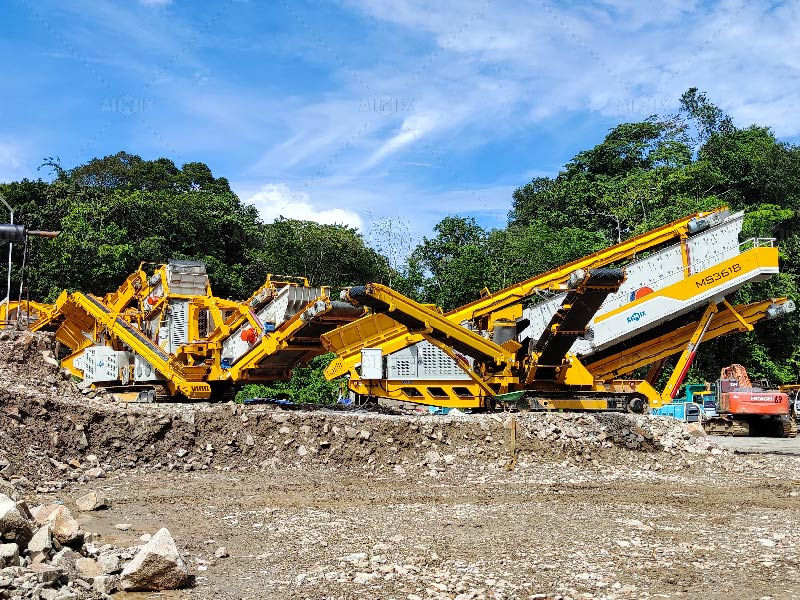Choose a Concrete or Steel Foundation for Your Stone Crushing Plant?
- info515452
- 3月4日
- 讀畢需時 4 分鐘
When setting up a stone crushing plant, one of the most critical decisions involves choosing the appropriate foundation. The foundation serves as the base that supports the entire machinery and equipment of the plant, including crushers, screens, and conveyors. A proper foundation ensures stability, durability, and efficiency during operations. In the case of a stone crusher plant or an aggregate crusher plant, there are typically two types of foundation options to consider: concrete and steel. Each has its own set of benefits and considerations, and the choice will depend on several factors such as plant size, operational requirements, and the environment in which the plant will operate.
In this article, we will explore the advantages and disadvantages of concrete and steel foundations for rock crusher plants and provide insights to help you make an informed decision.

Concrete Foundations for Stone Crushing Plants
1. Durability and Stability
Concrete foundations are known for their strength and long-lasting durability. A concrete base is highly resistant to vibration, making it an excellent choice for stone crushing plants where heavy machinery creates substantial mechanical forces. For large stone crusher plants(planta trituradora de piedra), especially those with high crushing capacities, a concrete foundation can handle the significant weight and stresses associated with the machinery.
Concrete is also more resistant to environmental factors like water and chemicals, which can deteriorate other materials over time. This makes concrete foundations a great choice for plants operating in harsh environments, such as wet or corrosive areas. The stability offered by concrete foundations reduces the need for frequent maintenance, ensuring that your aggregate crusher plant operates smoothly for a longer period.
2. Cost-Effectiveness
In many cases, concrete foundations are more cost-effective than steel options, particularly for stationary plants. Concrete is relatively inexpensive compared to steel and readily available. It’s also easier to form and pour, especially in large quantities. For a rock crusher plant with a fixed setup, concrete is often the preferred choice because of its reliability and lower overall costs.
3. Maintenance Considerations
While concrete is durable, it can be susceptible to cracks or damage over time due to extreme weather conditions or heavy operational stresses. Regular inspection and maintenance may be needed to repair any cracks or damage that could compromise the stability of the foundation. However, when compared to steel, concrete requires less frequent upkeep.
Steel Foundations for Stone Crushing Plants
1. Flexibility and Mobility
Steel foundations offer a high degree of flexibility and are particularly advantageous for plants that need to be relocated or adapted over time. A mobile stone crusher plant or a plant that requires periodic adjustments to accommodate different types of rock and aggregate may benefit from a steel foundation. Steel is lightweight and easy to modify, making it ideal for mobile crushing plants or plants that require quick reconfiguration.
Steel foundations can also support heavy machinery and provide strength and stability for aggregate crusher plants(planta trituradora de agregados). However, while steel is strong, it is generally not as durable as concrete in the long term.
2. Faster Installation
Steel foundations are quicker to install than concrete ones. For projects with tight timelines, choosing steel can save a significant amount of time, allowing the plant to start operations sooner. Steel components are prefabricated off-site and then assembled on-site, making the process more efficient.
This makes steel foundations a viable option for temporary or short-term projects where a mobile or rapidly deployable plant is required. Rock crusher plants that need to be operational quickly often rely on steel foundations for their speed of setup.
3. Maintenance and Longevity
While steel foundations are generally easier to maintain and install, they are more prone to corrosion, especially in wet or salty environments. Over time, steel can be affected by rust and other forms of corrosion, which can undermine the foundation's integrity. In such cases, regular maintenance and protective coatings may be necessary to extend the lifespan of the steel structure.
In comparison to concrete, steel foundations may need more frequent repairs and attention to maintain optimal performance, especially in harsh environmental conditions.
Factors to Consider When Choosing Between Concrete and Steel Foundations
1. Plant Location and Environmental Conditions
The location of your stone crushing plant plays a significant role in deciding between concrete and steel foundations. For plants located in areas with extreme temperatures, moisture, or chemicals, concrete may provide the best long-term durability. In contrast, steel may be better suited for regions where rapid installation and flexibility are more critical.
2. Plant Type and Size
The size and type of your stone crusher plant should also influence your decision. Larger, stationary plants that require high stability and long-term reliability will benefit more from concrete foundations. Smaller, mobile plants or temporary setups can benefit from the flexibility and fast installation of steel.
3. Budget Considerations
Cost is always an important factor in any construction project. Concrete foundations are generally more affordable than steel, particularly when considering long-term maintenance. However, steel may be more cost-effective for smaller or temporary setups that require flexibility and quick deployment.
Conclusion
Choosing the right foundation for your rock crusher(trituradora de rocas) plant is essential for ensuring optimal performance and minimizing downtime. Both concrete and steel foundations have their advantages, and the best choice depends on your specific needs, including plant size, environmental conditions, and operational flexibility. Concrete foundations offer long-term stability, durability, and cost-effectiveness, making them ideal for large, stationary aggregate crusher plants. On the other hand, steel foundations provide flexibility, faster installation, and mobility, which are perfect for smaller or mobile crushing operations.
By carefully evaluating your plant's requirements and consulting with experienced engineers, you can make the right decision to ensure that your stone crushing plant operates efficiently and reliably for years to come.






留言